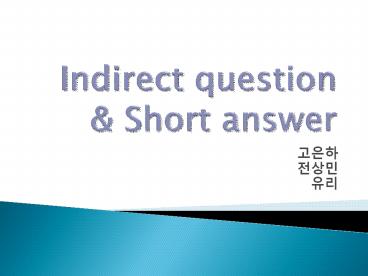Indirect question - PowerPoint PPT Presentation
1 / 19
Title: Indirect question
1
Indirect question Short answer
- ???
- ???
- ??
2
Unit 9. Indirect question
?Main points 1. to ask for information or
help 2. subject verb. 3. if or whether
3
?indirect question beginning with Could you
tell me or Do you know Could you tell
me how far it is to the bank? Do you know where
Jane is?
??? ?? ??
4
I wonder _______.
?asking politely I wonder if you can help
me. I was wondering whether you could give
me some information. ?to indicate what you are
thinking about. I wonder what shell look
like.
??? ??
???? ?? ?? ??? ??
5
? subject verb Do you know where Jane is?
I wonder if you can help me.
?? ?? ??? ??, ????? ?????
6
? do for emphasis, or
to make a contrast I was beginning to wonder
if he does do anything. He wondered
whether it really did make any difference to
the outcome.
(??? do)
7
?whether a choice of possibilities I
wonder whether it is the police or just a
neighbor. ? or not immediately after
whether, but not after
if. I wonder whether or not we are so
different if or not (x)
from our ancestors.
??? ???? ??
?? ???
8
Unit 10. Short Answer
- ltMain Pointgt
- A short answer uses an auxiliary, a modal, or the
main verb be. - ?? ??? ???? be??? ??
- A short answer can be in the form of a statement
or a question. - ?? ??? ???? ??? ??? ? ??
9
- 1
- Short answers common on spoken English
- yes or no before the short answer
- ?? ??? ?? ???? ?? ?? ???. ?? ??, ?? ??? ????
yes/no ??? ?? ?, ??? ???? be??? ???? ?? ??? ? ?
??. ??? ?? yes ? no? ?? ?? ?? ???.
10
- 1
- Does she still want to come?
- auxiliary do -Yes,
she does. - ??? ??? ?? ?????? -?, ??????
- Can you imagine what it might feel like?
- modal can
-No, I cant. - ?? ??? ???? ??? ? ??? -??, ??? ? ??.
- Are you married? -I am.
- main verb be
- ??? ?????? -?,
?????.
11
- 1
- Yes, I will is more polite or friendly than
Yes - Will you have finished by lunchtime?
- -Yes, I will (have finished by lunchtime).
- People often repeat all the words used in the
question when they feel angry or impatient. - Yes, I will ? Yes? ??? ?? ?? ???? ?? ???
? ?? ? ?? ??? ????. - ???? ?? ??? ???? ???? ? ??? ???? ????.
12
- 2
- to agree or disagree
- ??? ?? ?? ??? ? ?? ????? ???? ?? ?? ??? ???
??. - You dont like Joan? -No, I dont.
- ??? Joan? ?????? -?, ????.
- Im not coming with you. -Yes, you are.
- ?? ?? ?? ?? ???. ?, ???.
13
- 2
- pro-verb (???) do
- He never comes on time.
- Oh yes he
does. - ?? ?? ???? ?? ??.
-
-? ?? ?? ??.
14
- 3
- Answering with a short question
- ??? ?? ?? ??? ?? ?? ?? ?????? ????.
- Hes not in Japan now. -Oh, isnt he?
- ?? ?? ??? ???. -?, ????
- He gets free meals. -Does he?
- ?? ?? ???? ?????. ????
15
- 3
- to express your reaction to what has been said
- to show interest or surprise.
- Dad doesnt help me at all.
- -Doesnt he? Why not?
- Penny has been climbing before.
- Oh, has she? When was that?
- ??? ???? ?? ??? ?? ??? ?????? ??
- ???, ?? ???? ?? ?? ??? ??? ???? ??
- ???. ?? ??, ???? ???? ??? ? ???.
16
- definite agreement with a positive statement
- use a negative short question
- Well, that was very nice.
- - Yes, wasnt it?
- to ask more information, use a wh-word
- Use so for positive statements
- He saw a snake.
- -Where?
- Can you pass me the cup?
- - Which one?
- You were different then.
- -So were you.
17
- Use neither or nor for negative statements
use neither or nor with an auxiliary, modal,
of the main verb be - NeitherNot either
- I dont normally drink at lunch.
- -Neither do I.
- I cant do it.
- -Nor can I.
- He doesnt understand.
- -We dont either.
18
- Use so after verbs think, hope, expect,
imagine, suppose when the answer to question is
yes - Use Im afraid so when you are sorry that the
answer is yes - Youll be home at six?
- -I hope so.
- So it was worth doing?
- -I suppose so.
- Is it raining?
- -Im afraid so.
19
- With that verbs in short answer, you also form
negatives with so - You can say I hope not and Im afraid not
- Will I see you again?
- -I dont suppose so.
- Is Barry Knight a golfer?
- -No, I dont think so.
- It isnt empty, is it?
- -I hope not.































